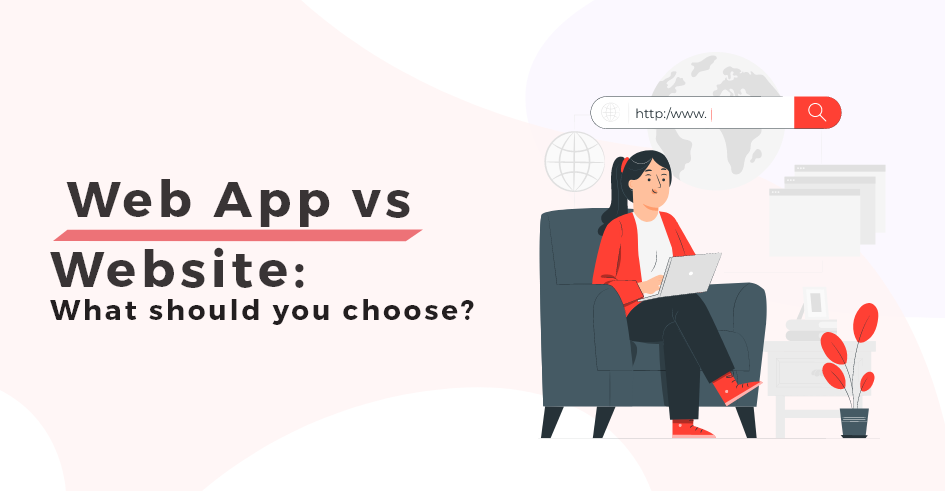Businesses often face a pivotal decision when establishing their online presence – should they opt for a traditional website or a sophisticated web application? The choice between a web app and a website can significantly affect user experience, functionality, and overall success. In this comprehensive guide, we’ll explore the distinctions of web app vs website, helping you make an informed decision tailored to your specific needs.
What Is a Website?
A website, often referred to as the digital face of your business, is a collection of interconnected web pages accessible through a unique domain name. These web pages are versatile canvases, capable of housing text, audio, video, documents, and various Internet-accessible content. When comparing web app vs website, traditional websites often focus on presenting static visual and textual information. In contrast, the ever-evolving landscape of web technologies has ushered in a new era.
Today, websites are not confined to passive information displays. Modern web development allows for the creation of interactive web spaces, blurring the lines between web app vs website, websites and applications. These dynamic websites go beyond the basics of HTML and CSS, venturing into the realm of advanced programming languages and databases. The result? A seamless, user-centric experience.

Unlike their static counterparts, dynamic websites use cutting-edge web design tools to offer personalized content to users. Your website can adapt its presentation based on factors such as the user’s location, time, date, and more. This versatility is what sets dynamic websites apart, making them invaluable for businesses looking to engage a diverse online audience.
Regardless of the kind of website or web app vs website you choose to create for your business, there’s one fundamental rule to follow: populate it with original, meaningful content. Your website’s content is its soul, the reason why visitors choose to explore your digital space. In a world brimming with information, authenticity is your most potent asset. Ensure that your content is not plagiarized or AI-generated, but rather a reflection of your unique perspective and expertise.
What Is a Web Application?
A web application, often referred to as a web app, is a versatile software accessible through a web browser. What sets web applications apart from their mobile and desktop counterparts is that they don’t necessitate downloads. Users can conveniently access web apps through a simple URL, just like they would with websites. These applications share many programming languages and technologies with websites, but the development of web applications, in the web app vs website comparison, is generally more intricate. This complexity arises from their ability to store and manipulate data based on user input, making them powerful tools.

Web applications shine in their capability to help users accomplish a wide array of tasks. Whether you need to track expenses, register for classes, create compelling advertisements, scan and convert files, or perform countless other functions, web apps have got you covered. It’s important to note that nearly all web apps involve server-side processing. Apps requiring server-side processing are dynamic, whereas those that don’t are static. However, stationary web applications are a rare find.
If you’re considering creating a web application for your business, it must serve a purpose users find valuable. After all, web apps that don’t provide value won’t see much use. Businesses favor web applications for several reasons. They offer scalability, eliminate the need for mobile app store approval, support all modern browsers, and are compatible across various platforms, making them a wise choice for businesses of all sizes.
Web app vs Website

While websites and web applications share some similarities, they represent distinct stages in the evolution of the online world. Understanding the pivotal differences between these two digital entities is essential in navigating the digital landscape effectively. Here, we delve into the core disparities that set websites and web applications apart. When considering the choice between a web app vs website, these distinctions become even more crucial.
|
Aspect
|
Web App |
Website
|
| Functionality |
Interactive, user manipulation. |
Informative, limited interaction. |
| Complexity |
Complex, advanced programming. |
Less complex, static content. |
| Access |
Requires registration and authentication. |
Public access, no authentication |
Functionality
From a user’s perspective, the most pronounced disparity between web app vs website lies in their functionality. Web app vs website differentiation becomes evident in their user experience. Websites primarily serve as informative platforms, providing content that users can view, read, or listen to. However, interaction is limited, and users cannot actively manipulate the content. In stark contrast, web applications are designed to empower users. They offer not only viewable content but also incorporate interactive elements, enabling users to engage and manipulate data actively. Think of a form on a website as a primary example of interactive web content. Essentially, any online service that involves active user participation can be classified as a web application.
Complexity
Web applications are undeniably more complex than websites, emphasizing the importance of understanding the differences between web app vs website. While websites consist of static web pages, modern web development standards have introduced interactivity, but they remain relatively straightforward compared to web applications. The intricacy of web app vs website extends beyond mere functionality. They require robust backend services, accommodate various user levels, and possess data processing capabilities. Moreover, ensuring the security of web app vs website necessitates advanced solutions. Building web applications often requires employing not only standard web technologies like JavaScript, HTML, and CSS but also advanced programming languages and frameworks such as PHP, alongside server-side scripts. Additionally, user experience (UX) and user interface (UI) design play an integral role in web app vs website, as users actively interact with these platforms, making intuitive and engaging design imperative.
Access
Public access characterizes websites, welcoming all visitors without the need for registration or authentication. In contrast, in the web app vs website debate, web applications nearly always mandate user registration and authentication. This requirement arises from the personalized nature of the services they offer. Take, for instance, banking applications – while they provide similar services to all account holders online, each user’s experience is tailored to their unique banking information. Thus, user authentication is fundamental for delivering customized services.
Web app vs Website: Which Is Right for My Business?
Now that you’re well-informed about the distinctions between websites and web applications, including the key decision factor of web app vs website, you’re probably pondering which is the ideal choice for your business. Making this decision can be challenging, but it all comes down to your goals and vision.
If you aim to introduce your business and its products or services to users, a website is likely your best bet. On the other hand, if you intend to offer a service to users, then developing a web application is the way to go. You can also go for best website builders to get a website that will out perform your competition. The lines between websites and web applications can blur when you want to enable user registrations or facilitate product purchases.
Why Should I Develop a Website?

1. Create Social Proof
In today’s information-rich environment, consumers have an abundance of data at their fingertips. Modern websites play a vital role in creating social proof for businesses. Most individuals research a company online before making a purchase.
To build social proof, websites use user reviews, trust badges, and performance-related data strategically. For instance, if your business manufactures cars, showcasing a JD Power award on your website is a valuable form of social proof. Without a website, it’s challenging to disseminate award information, positive reviews, and key data.
2. Showcase Product or Service Offerings
The primary reason companies create websites is to showcase their products or services. Despite the rise of social media and various apps, a website remains the best platform to provide users with in-depth insights into your offerings, making it a crucial choice in the web app vs website debate. With a website, you can offer detailed descriptions, virtual models, answers to frequently asked questions, and demonstrations of your products or services.
Even if you don’t sell products online, having a website is valuable, especially for businesses selling high-value or luxury products and services. People prefer to research a product or service before making a purchase.
3. Aid in Branding Efforts
Building and promoting a brand is a time-consuming effort that requires alignment across all your marketing endeavors. A website is one of the most effective ways to establish and reinforce your brand’s identity. It serves as a constant reminder to both consumers and your team of your company’s brand guidelines.
Think of your website as a tool to make a lasting impression on your target audience. Use it to set the tone of your brand, make stylistic choices, and create content in line with your branding strategy. Building a successful brand often starts with a website, and when considering the choice between a web app vs website, it plays a pivotal role in shaping your brand’s online presence.
4. Provide Customer Support
A website offers a convenient means of providing support to your customers 24/7. Many people prefer self-service support, and your website can provide answers to frequently asked questions, troubleshooting guidance, and an automated online chat feature to assist users in resolving common issues.
Modern consumers expect to find solutions to their problems online. Using your website to provide answers and guidance to users encountering issues not only pleases your customers but also fosters brand loyalty. You can’t predict when a customer will need support, but with a website, your business is always ready to assist customers.
Why Should I Develop a Web Application?

Still uncertain about whether a website or a web application suits your needs? To add complexity to the decision, many websites include web applications for specific services. Here’s when you should opt for a web application:
1. Users Will Manipulate Information
The hallmark of a web application is its interactivity. While modern websites offer more interactivity, if users need to input and manipulate data, a web application is the superior choice. There are numerous scenarios where users may need to use data.
For instance, if your goal is to enable users to input and submit payment information for online purchases, a web application is essential. Any web service functioning as an online tool performs better as a web application rather than a website.
2. You Need Authentication
Do you require users to log in? If authentication is necessary, a web application is the ideal solution. While it may seem that both websites and web applications offer authentication, websites with authentication functionality employ web applications to deliver this service.
In many cases, web applications are developed to complement existing websites. This common practice can blur the distinction between web applications and websites. Remember that websites and web applications are distinct but frequently used together.
3. You Want to Avoid App Store Approval
If you intend to create an application that users can use on their mobile devices without going through the app store approval process, web applications are an excellent choice. Businesses are increasingly turning to web applications to provide rich mobile experiences that bypass the iOS App Store and Google Play Store.
Progressive Web Apps (PWAs) are revolutionizing mobile development. PWAs are web applications that look and feel like native mobile apps. They can even send push notifications and utilize other native device features.
4. You Want to Control All Updates
A web application may be the best fit for your business if you want to maintain complete control over the update schedule for all users. Traditional software requires users to update their applications when new updates are released manually. Most people have delayed updating software for various reasons.
Web applications can be uniformly updated at the source, sparing users from manual updates. Your business can enhance security measures and ensure a consistent user experience with a web application.
All things considered
While websites can incorporate app-like components to allow users to complete tasks, distinguishing between websites and web apps can remain challenging. If you’re uncertain about the best direction for your business, consider consulting with an app development partner. An experienced web design company can assist you in designing and developing the most suitable solution for your business. Focus on obtaining the right solution for your business and leave the semantics of website versus web application to the experts in web design.
TechnBrains for Web Design and Development
When it comes to navigating the dynamic realm of web design and development, TechBrains stands out as the premier choice. Our expertise transcends the traditional boundaries of web app vs website, ensuring that your digital presence is optimized for excellence. TechBrains delivers state-of-the-art solutions, tailored precisely to your needs. With a keen understanding of the nuances of web app vs website, we craft interactive and visually captivating platforms. We recognize the significance of choosing between a web app vs website and guide you to the ideal solution. TechBrains transforms your vision into a reality, offering web solutions that not only captivate but also perform seamlessly.










